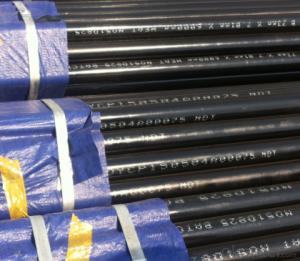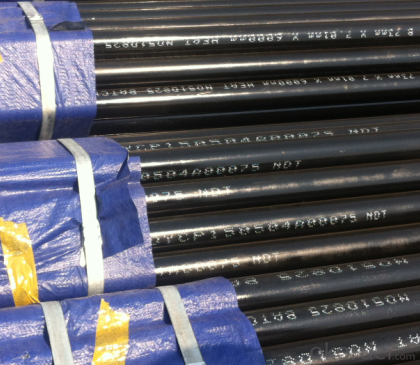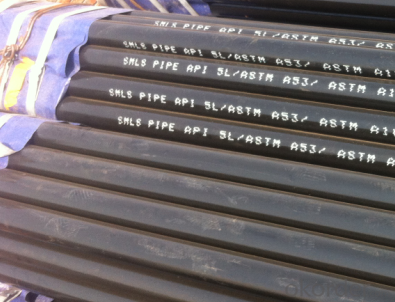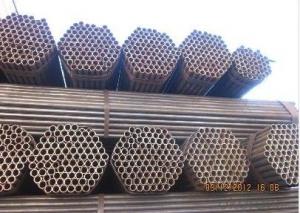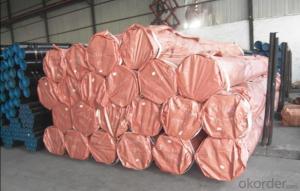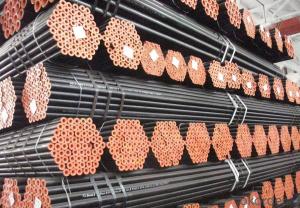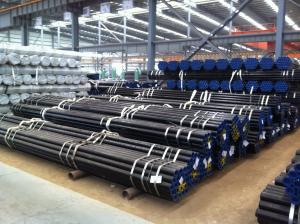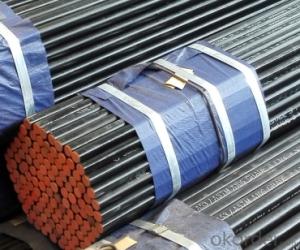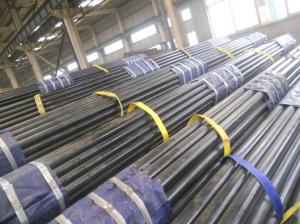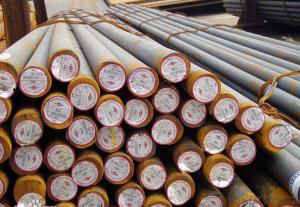CARBON STEEL SEAMLESS PIPE API 5L GRADE B PSL1
- Loading Port:
- Tianjin
- Payment Terms:
- TT OR LC
- Min Order Qty:
- 25 m.t.
- Supply Capability:
- 2000 m.t./month
OKorder Service Pledge
OKorder Financial Service
You Might Also Like
1、Structure of CARBON STEEL SEAMLESS PIPE API 5L GRADE B PSL1 :
Seamless pipe is formed by drawing a solid billet over a piercing rod to create the hollow shell. As the manufacturing process does not include any welding, seamless pipes are perceived to be stronger and more reliable. Historically seamless pipe was regarded as withstanding pressure better than other types, and was often more easily available than welded pipe.
2、Main Features of CARBON STEEL SEAMLESS PIPE API 5L GRADE B PSL1
• High manufacturing accuracy
• High strength
• Small inertia resistance
• Strong heat dissipation ability
• Good visual effect
• Reasonable price
3、CARBON STEEL SEAMLESS PIPE API 5L GRADE B PSL1 Specification:
Standard | GB, DIN, ASTM ASTM A106-2006, ASTM A53-2007 |
Grade | 10#-45#, 16Mn 10#, 20#, 45#, 16Mn |
Thickness | 8 - 33 mm |
Section Shape | Round |
Outer Diameter | 133 - 219 mm |
Place of Origin | He Bei China (Mainland) |
Secondary Or Not | Non-secondary |
Application | Hydraulic Pipe |
Technique | Cold Drawn |
Certification | API |
Surface Treatment | factory state or painted black |
Special Pipe | API Pipe |
Alloy Or Not | Non-alloy |
Length | 5-12M |
Outer Diameter | 21.3-610mm |
Grade | 20#, 45#, Q345, API J55, API K55, API L80, API N80, API P110, A53B |
Standard | ASME, ASTM |
1) Material:20#(ASTM A 106/A53 GRB.API5LGRB,GB),45#,16Mn,10#.
2) Specification range:OD:21.3-610mm,WT:6-70mm,length:6-12m or according to the requirement of clients.
3) Excutive standards:GB,ASME API5L.ASTM A 106/A53,Despite of the above standards,we can also supply seamless steel pipe with standard of DIN,JIS,and so on,and also develop new products according to the requirements of our clients!
4) Surface:black lacquered,varnish coating or galvanized.
5) Ends:Beveled or square cut,plastic capped,painted.
6) Packing:bundles wrapped with strong steel strip,seaworthy packing.
4、Packaging & Delivery of CARBON STEEL SEAMLESS PIPE API 5L GRADE B PSL1
Packaging Details: | seaworthy package,bundles wrapped with strong steel strip |
Delivery Detail: | 30-45days after received 30%TT |
5、FAQ of CARBON STEEL SEAMLESS PIPE API 5L GRADE B PSL1:
①How is the quality of your products?
Our products are manufactured strictly according to national and internaional standard, and we take a test
on every pipe before delivered out. If you want see our quality certifications and all kinds of testing report, please just ask us for it.
Guaranteed: If products’ quality don’t accord to discription as we give or the promise before you place order, we promise 100% refund.
②How about price?
Yes, we are factory and be able to give you lowest price below market one, and we have a policy that “ for saving time and absolutely honest business attitude, we quote as lowest as possible for any customer, and discount can be given according to quantity”,if you like bargain and factory price is not low enough as you think, just don’t waste your time.Please trust the quotation we would give you, it is professional one.
③Why should you chose us?
Chose happens because of quality, then price, We can give you both.Additionally, we can also offer professional products inquiry, products knowledge train(for agents), smooth goods delivery, exellent customer solution proposals.Our service formula: good quality+good price+good service=customer’s trust
SGS test is available, customer inspection before shipping is welcome, third party inspection is no problem.
6、CARBON STEEL SEAMLESS PIPE API 5L GRADE B PSL1 Images:
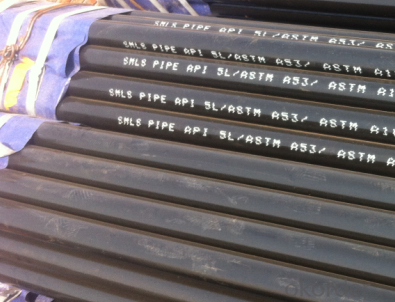
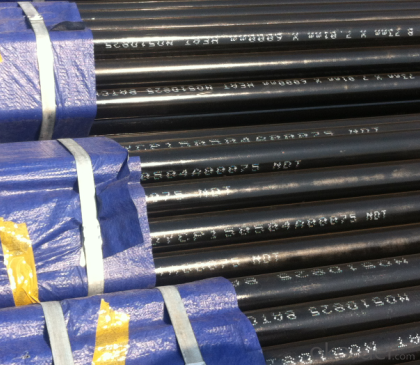
- Q: What are the safety regulations for working with steel pipes?
- The safety regulations for working with steel pipes may vary depending on the specific circumstances and location, but some common safety measures include wearing appropriate personal protective equipment (PPE) such as gloves, safety glasses, and steel-toed boots, ensuring proper handling techniques to prevent injuries, using proper lifting equipment to prevent strain or back injuries, implementing proper ventilation and respiratory protection when working in confined or poorly ventilated spaces, and following proper procedures for welding, cutting, or bending steel pipes to minimize the risk of fire or explosions. It is essential to consult and adhere to local safety regulations and guidelines to ensure a safe working environment when dealing with steel pipes.
- Q: How are steel pipes protected against fire hazards?
- Steel pipes are protected against fire hazards through various methods such as fire-resistant coatings, fire wraps, or fireproof cladding. These protective measures prevent the pipes from being exposed to high temperatures and flames, ensuring their structural integrity and reducing the risk of fire-related incidents.
- Q: What is the importance of corrosion resistance in steel pipes?
- Corrosion resistance in steel pipes is crucial as it helps prevent the deterioration of the pipes due to chemical reactions with substances in their surroundings. This resistance ensures the longevity and durability of the pipes, minimizing the risk of leaks, clogs, and structural failures. Additionally, it helps maintain the quality and safety of the transported fluids or gases, preventing contamination or degradation. Overall, corrosion resistance in steel pipes is essential for maintaining efficient and reliable infrastructure systems in various industries such as oil and gas, water supply, and construction.
- Q: Are steel pipes suitable for use in acidic environments?
- No, steel pipes are generally not suitable for use in acidic environments because they are prone to corrosion in such conditions.
- Q: How are steel pipes used in the chemical industry?
- Steel pipes are widely used in the chemical industry for various purposes such as transporting chemicals, gases, and liquids. They are known for their strength, durability, and resistance to corrosion, making them suitable for handling corrosive substances. Steel pipes are used for transferring raw materials, intermediate products, and final products within chemical plants, as well as for connecting different equipment and machinery. They are essential for maintaining a safe and efficient flow of chemicals throughout the industry.
- Q: How are steel pipes repaired in case of damage?
- Steel pipes can be repaired in case of damage through various methods such as welding, patching, or using clamps. The specific repair technique depends on the type and extent of the damage.
- Q: Are metal spiral tubes the same as metal bellows?
- The spiral pipe is mainly used in the pipeline of petroleum and natural gas, and its specifications are indicated by outer diameter * wall thickness.
- Q: Is the seamless steel pipe used in the market hot or cold drawn?
- Outside diameter 89, most are cold drawn, more than 89 hot rolling.
- Q: How are steel pipes protected against external moisture?
- Steel pipes are protected against external moisture through a variety of methods. One common method is the application of a protective coating or paint on the surface of the pipes. This coating acts as a barrier, preventing moisture from coming into direct contact with the steel. The coating can be made of different materials, such as epoxy, polyethylene, or zinc, depending on the specific requirements and environment. Another method of protection is through the use of corrosion inhibitors. These inhibitors are added to the internal or external surfaces of the pipes, forming a protective layer that prevents moisture from causing corrosion. Corrosion inhibitors can be in the form of chemicals, such as rust converters or rust preventatives, which react with the steel to form a protective barrier. Additionally, steel pipes can be protected against external moisture through cathodic protection. This technique involves the use of sacrificial anodes or impressed current to create an electric current that protects the steel. Sacrificial anodes, typically made of zinc, aluminum, or magnesium, are attached to the steel pipes and corrode over time instead of the steel, thus preventing moisture-induced corrosion. Furthermore, proper insulation and waterproofing measures are crucial in protecting steel pipes from external moisture. Insulation materials, such as foam or tape, are applied to the pipes to provide an additional layer of protection and prevent moisture infiltration. Waterproofing measures, such as the use of sealants or membranes, can also be implemented to ensure that no moisture seeps into the pipes. Regular maintenance, including inspections and repairs, is essential to ensure the continued protection of steel pipes against external moisture. By promptly addressing any areas of damage or corrosion, the integrity of the protective measures can be maintained, prolonging the lifespan of the steel pipes and preventing costly repairs or replacements in the future.
- Q: What are the different types of coatings used on steel pipes?
- There are several types of coatings that are commonly used on steel pipes to enhance their durability and protect them from corrosion. Some of the most common types of coatings include: 1. Fusion-Bonded Epoxy (FBE) Coating: This coating is applied to the steel pipe through a process of heating and melting the epoxy powder, which then fuses to the surface. FBE coatings provide excellent corrosion resistance and are commonly used in water pipelines and oil and gas industries. 2. Polyethylene (PE) Coating: PE coatings are applied to steel pipes using a similar process as FBE coatings. PE coatings provide a protective layer that is resistant to moisture, chemicals, and abrasion. They are commonly used in gas pipelines and underground water pipelines. 3. Polypropylene (PP) Coating: PP coatings are similar to PE coatings in terms of their application process and protective qualities. However, PP coatings offer enhanced resistance to higher temperatures, making them suitable for applications such as chemical processing plants and refineries. 4. Concrete Weight Coating (CWC): CWC is a special coating that involves applying a layer of concrete to the steel pipe. This coating provides additional weight to the pipe, making it more stable and resistant to buoyancy in underwater or submerged applications. 5. Zinc Coating: Zinc coatings, such as hot-dip galvanizing, involve immersing the steel pipe in a bath of molten zinc. This process creates a protective layer of zinc on the surface of the pipe, offering excellent corrosion resistance. Zinc coatings are commonly used in outdoor applications, such as fencing, guardrails, and water pipelines. 6. Bituminous Coating: Bituminous coatings involve applying a layer of bitumen or asphalt to the steel pipe. This coating provides excellent resistance to water and chemicals, making it suitable for underground pipelines and structures. These are just a few examples of the different types of coatings used on steel pipes. The choice of coating depends on factors such as the intended application, environmental conditions, and the level of corrosion resistance required.
Send your message to us
CARBON STEEL SEAMLESS PIPE API 5L GRADE B PSL1
- Loading Port:
- Tianjin
- Payment Terms:
- TT OR LC
- Min Order Qty:
- 25 m.t.
- Supply Capability:
- 2000 m.t./month
OKorder Service Pledge
OKorder Financial Service
Similar products
Hot products
Hot Searches
Related keywords
